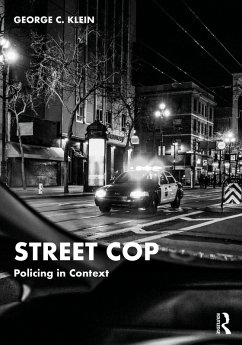
Managing Policy and Reform in an Era of American Police Conflict (eBook, ePUB)
Who Will Guard the Guardians?
Versandkostenfrei!
Sofort per Download lieferbar
39,95 €
inkl. MwSt.
Weitere Ausgaben:

PAYBACK Punkte
20 °P sammeln!
The Greek philosopher, Socrates, posed a guardian model that would protect his Athenian world, the custodes (watchmen), yet mused who would guard them but themselves. In The Republic, Plato spoke favorably about the guardians of the republic; they should be trusted to behave and perform their duties appropriately without oversight. Half a millennium later, the Roman satirist, Juvenal, proposed that men who feared their wives' infidelity could neither trust them nor the guardians who guarded them. Similarly, James Madison opposed oppression through blind trust and, thus, conceptualized Madisoni...
The Greek philosopher, Socrates, posed a guardian model that would protect his Athenian world, the custodes (watchmen), yet mused who would guard them but themselves. In The Republic, Plato spoke favorably about the guardians of the republic; they should be trusted to behave and perform their duties appropriately without oversight. Half a millennium later, the Roman satirist, Juvenal, proposed that men who feared their wives' infidelity could neither trust them nor the guardians who guarded them. Similarly, James Madison opposed oppression through blind trust and, thus, conceptualized Madisonian Democracy. Quis custodiet ipsos custodies? Who will guard the guardians? In an era of conflict with America's police and the communities they serve, today's publicly expressed attitudes toward law enforcement often reflect Socrates' dilemma and the concerns of Juvenal more than that of Plato's tributes. Contemporary debates concerning the increase in violent crime and the need for fundamental changes to American policing reached a new intensity and stalemate with the death of George Floyd in Minneapolis in May 2020.
Police officers shot and killed 999 people in 2019 and 1021 people in 2020 in the United States. 2020 was also one of the deadliest years for law enforcement, with 264 officers killed, the highest since 1974. In the first six months of 2021, 523 civilians were shot and killed by officers. Numerous active and former police officers face criminal charges for the January 6 United States Capitol Attack in Washington, DC, in 2021. Many current and former employees of the U.S. Border Patrol were discovered to be members of a Facebook group that posted racist and anti-immigration content. Sixty current members were found to have committed misconduct by posting "explicit and violent messages" mocking migrants and threatening lawmakers on the site. Communities are now hiring civilians to high positions in the police department's command staff, justifying the need to improve deteriorating community relations. For the first time in its 27 years of measuring confidence in the police in the United States, Gallup found that most American adults do not trust law enforcement.
This book investigates and exposes the complex challenges facing law enforcement leaders and government officials with police reform, policies and standards, police accreditation, and police legitimacy in the eyes of the community. Through informative and educational discussions with law enforcement leaders from various agencies, professional police organizations, and academic researchers, the book qualitatively evaluates individual autonomy, organizational culture, and political environments, which influence strategic decisions made on policy and reform efforts by law enforcement officials in the United States within the milieu of national police accreditation.
Police officers shot and killed 999 people in 2019 and 1021 people in 2020 in the United States. 2020 was also one of the deadliest years for law enforcement, with 264 officers killed, the highest since 1974. In the first six months of 2021, 523 civilians were shot and killed by officers. Numerous active and former police officers face criminal charges for the January 6 United States Capitol Attack in Washington, DC, in 2021. Many current and former employees of the U.S. Border Patrol were discovered to be members of a Facebook group that posted racist and anti-immigration content. Sixty current members were found to have committed misconduct by posting "explicit and violent messages" mocking migrants and threatening lawmakers on the site. Communities are now hiring civilians to high positions in the police department's command staff, justifying the need to improve deteriorating community relations. For the first time in its 27 years of measuring confidence in the police in the United States, Gallup found that most American adults do not trust law enforcement.
This book investigates and exposes the complex challenges facing law enforcement leaders and government officials with police reform, policies and standards, police accreditation, and police legitimacy in the eyes of the community. Through informative and educational discussions with law enforcement leaders from various agencies, professional police organizations, and academic researchers, the book qualitatively evaluates individual autonomy, organizational culture, and political environments, which influence strategic decisions made on policy and reform efforts by law enforcement officials in the United States within the milieu of national police accreditation.
Dieser Download kann aus rechtlichen Gründen nur mit Rechnungsadresse in A, B, BG, CY, CZ, D, DK, EW, E, FIN, F, GR, HR, H, IRL, I, LT, L, LR, M, NL, PL, P, R, S, SLO, SK ausgeliefert werden.













